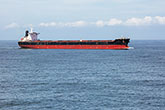RST assists in reducing respirable dust emissions ahead of OEL law changes
Published by Stephanie Roker,
Editor
Dry Bulk,
While workplace exposure standards for airborne contaminants are being reviewed by Safe Work Australia, leading fine particle specialists Reynolds Soil Technologies (RST) is assisting companies to comply with current and incoming legal limits for respirable dust, including toxic silica dust.

Safe Work Australia, the national policy body responsible for Workplace Health and Safety laws, is expected to recommend that the regulated occupational exposure limits (OEL) for respirable dust is halved from 1 mg/m3 to 0.5 mg/m3 for silica dust and from 3 mg/m3 to 1.5 mg/m3 for other types of mineral dust.
Companies dealing with operational dust exposure are seeking RST’s advice on a range of fine particle problems in order to comply with the current OEL regulations and prepare for rigorous regulatory changes.
RST is an authority on dust control, with three decades of research and development positioning the mining and civil services company as a market leader for environmentally-safe fine particle management across the globe.
RST Operations and Technical Director David Handel said solving dust-related issues over the past thirty years had been challenging, but the company was achieving positive outcomes for clients by dramatically reducing respirable dust emissions in the workplace.
“We are seeing an increase in demand for our dust control formulas that reduce overall dust emission levels,” he said.
“Fine particulate of varying material types in a dry state create numerous health, environmental and operational challenges for our clients.”
Handel said the company’s services include expert dust analysis, advice and auditing, and mechanical and chemical solutions to reduce the dust levels to ensure a company remains compliant.
“We have been able to develop dust suppressants that are super concentrated and highly effective through ongoing research and development, with continual improvement programs and strategic alliances providing RST with the data to develop leading edge solutions,” he said.
“It is about finding the best solution that is cost effective and achieves immediate and long-term results.
“By utilising our specialty product range, companies in the fields of mining, stone cutting, quarrying, blasting, road and building construction and farming are able to treat and control their individual dust issues.
“These solutions are extremely effective in controlling the dust levels, providing the methods for a site operator to be in control of compliance with the new regulations.
“The first step for us is to fully assess and evaluate a problem and from there we recommend, design and implement a solution that suits a site’s specific needs to keep them operating within development consent requirements.”
RST has developed a range of suppression methods, products and services to specifically treat each dust levels across a company’s total operation, including storage, processing, and transfer and transport operations.
The company specialises in crusting agents that coat fine particles to prevent them from being blown or washed away, foaming formulas that suppress dust at transfer points and crushing operations, and water additives which bind fine particles and stabilise the materials being mined.
Applied by automated spray and dispensing systems, RST’s range of solutions prevent dust from becoming airborne by either tightly binding and suppressing the ultra-fine particles, or capturing and engulfing fine particles in a ‘total dust blanket’ effect.
Mining and quarrying companies and port operations around the world are using RST’s suite of solutions because of their ease of application, effectiveness and value.
RST’s range of products are formulated using the latest technologies in organic and inorganic polymers that alter the characteristics of water to electrostatically attract and capture smaller dust particles at a considerably faster rate than water alone.
The spin-off benefits from using RST solutions include major reductions in water consumption, erosion mitigation and decreased operational costs.
Read the article online at: https://www.drybulkmagazine.com/dry-bulk/22052019/rst-assists-in-reducing-respirable-dust-emissions-ahead-of-oel-law-changes/
You might also like
Bearing AI launches first AI-powered planning tool for shipping liners
Bearing AI has announced the launch of the first AI-powered planning tool for shipping liners to simulate the cost, emissions and performance impact of operational and commercial decisions.

